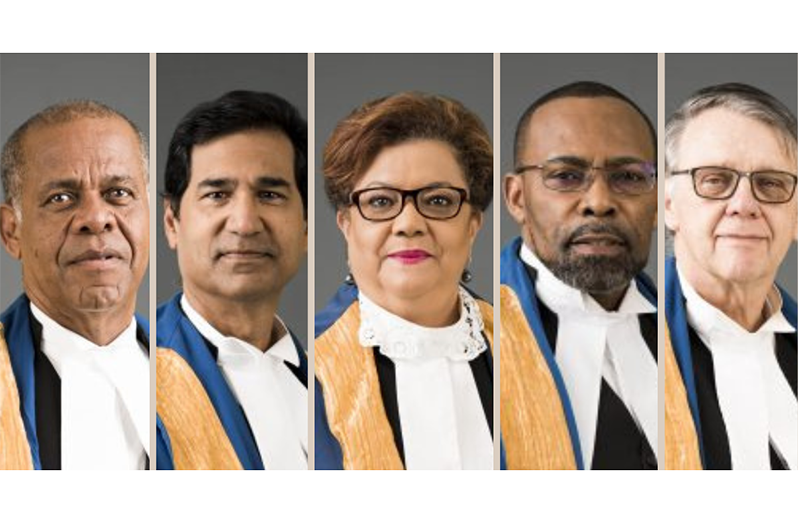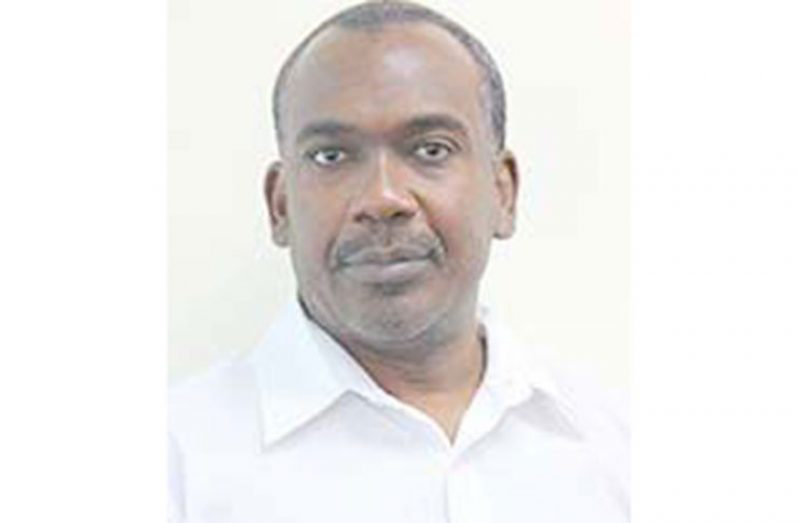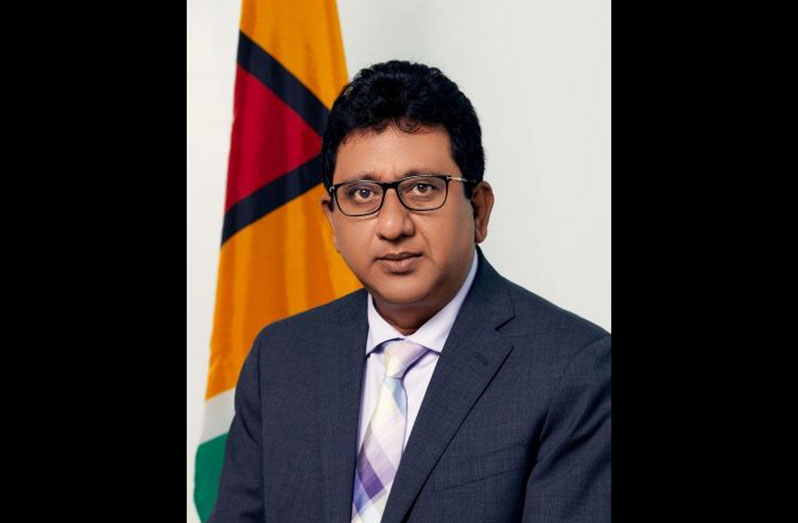-urges CCJ judges not to be ‘misled’ by opposition lawyers
ATTORNEY-GENERAL and Minister of Legal Affairs, Anil Nandlall, S.C., on Tuesday told the five-member panel of Caribbean Court of Justice (CCJ) judges that the Guyana Court of Appeal does not have jurisdiction to hear and determine the appeal of APNU+AFC’s Election Petition 99 of 2020.
Nandlall and Vice-President Dr Bharrat Jagdeo, as the General-Secretary of the People’s Progressive Party (PPP), are the applicants in the matter.
In January, at the Guyana Court of Appeal, Chancellor of the Judiciary Justice Yonette Cummings-Edwards granted a motion filed by Nandlall and Jagdeo for leave to appeal the court’s December 21, 2021 decision to the CCJ, which is Guyana’s final court of appeal. The Chancellor had also granted a stay of the CoA’s judgement.
By way of a majority ruling, the CoA had said it has jurisdiction to entertain an appeal challenging Chief Justice Roxane George’s decision to dismiss the said petition, on the grounds of late service, non-service, or improper service.

The initial appeal was filed in January 2021 by Roysdale Forde, S.C., the attorney for the APNU+AFC, and Trinidadian attorney, John Jeremie, S.C.
During Tuesday’s arguments at the CCJ, AG Nandlall said that the CoA does not have jurisdiction to hear the case, since the matter was thrown out by the High Court, and no evidence was heard.
Justices Jacob Wit, Maureen Rajnauth-Lee, Denys Barrow, Winston Anderson and Peter Jamadar are presiding over the case.
Nandlall submitted that the jurisdiction of the Court of Appeal to hear an appeal from a decision of the High Court in an election petition must either be found in the Constitution or in a statute.
Additionally, he said there is no statutory or constitutional instrument granting jurisdiction to the Court of Appeal to hear an appeal of an election petition for procedural impropriety, or any other reason not stated in Article 163 (1) of the Constitution.
According to Nandlall, the ruling of the CJ is not a decision granting or refusing leave to institute proceedings for the determination of any question referred to in Article 163 (1), neither did it involve a determination of a question referred to in the same article.
Nandlall said that the jurisdiction of the High Court was not invoked to answer this question in the petition, since the matter never went to trial, and was thrown out.
“If your honours are to examine the judgement of Chief Justice George, her honour quoted copious authorities that aggregate to say that when procedural requirements are not met, the impact and legal effect is that it affects the validity of the petition itself. It nullifies the petition, and that principle is inextricably linked to the jurisdiction of the court to entertain, such as a defective petition and those two principles marry, to prohibit an appeal, because there is really no decision from which one can appeal,” AG Nandlall said in his submissions.

He later chided the opposition’s lawyers for their “failure and desperate attempts” in their arguments to carve a jurisdiction for the Court of Appeal to adjudicate on elections matters.
This, he said, is futile and cannot be permitted.
AG Nandlall also criticised the respondents’ lawyers for conveying the wrong impression to the CCJ judges in their contentions that they were denied the protection of the rule of law when their petition was struck out for non-service.
“Your honours, that is a very flawed argument. The petitioners under the rules, were afforded the requisite time to serve their petition and they did not comply and 100 years of authorities have uniformly said that when there are such procedural violations, then there are certain ordained consequences and the authorities have uniformly applied them,” he said.
The AG further asked the bench of judges not to be persuaded by the opposition’s attorneys to undertake the “herculean task” and attempt the “legally impossible” to create a jurisdiction out of the “vacuous situation.”
He told the judges that by falling prey to these baseless contentions, they would be misled into committing a “grave judicial error.”
Meanwhile, Jeremie in his submissions contended that the Appellate Court has jurisdiction to hear the appeal of the dismissal of the petition.
He said that the Chief Justice had erred in law, and misdirected herself when she misapplied the doctrine of strict compliance, by holding that such compliance is related to the contents of the Affidavit of Service, instead of the filing of the Affidavit of Service in a timely manner.
“There are a number of other routes available to them which would allow them to have jurisdiction in this matter, and I recommend to your lordship the decision of the chancellor in particular and Justice of Appeal Gregory,” he said.
It was at this point that the CCJ decided to reserve its judgement in the case.
In the December 21, 2021, 2-1 decision, the Chancellor and Justice of Appeal Dawn Gregory said that the CoA has jurisdiction to hear and determine the appeal that was filed.
The Chancellor, in her ruling, held that the decisions of the Chief Justice were a final order on both the election petition and a preliminary issue of compliance.
She further contended that Article 163 of the Constitution states that an appeal to the Court of Appeal can be made from the decision of a judge of the High Court, granting or refusing leave to institute proceedings for the determination of any question.
“In my view, the Honourable Chief Justice sat in the elections jurisdiction of that matter, and considered the validity of the petition; determined that validity in relation to whether or not the proceeding could go on, and the Chief Justice dismissed those proceedings,” the Chancellor said.
Since the Chief Justice’s decision was a final order, the Chancellor said that the petitioners have a right to an appeal, given that there was no decision on the petition itself.
She also ruled that the Full Court of the High Court does not have the power to hear the appeal of an election petition dismissal, for want of compliance. She said it is a power Parliament should consider conferring upon the Full Court.
However, Justice of Appeal Rishi Persaud disagreed, as, according to him, the applicants, Monica Thomas and Brennan Nurse, had no right to appeal, since there was no final decision by Chief Justice George, who had dismissed the application in January, on the grounds of serious non-compliance. At the time, the matter was before the High Court.
Justice Persaud also ruled that the Full Court of the High Court does not have jurisdiction to entertain the appeal, and, therefore, ruled that the appeal was dismissed.




.png)









